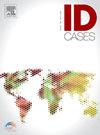Aeromonas veronii biovar sobria intestinal infection in a child girl after eating freshwater fish and drinking from a natural river in Southern Fars Province, Iran
IF 1
Q4 INFECTIOUS DISEASES
引用次数: 0
Abstract
Due to infrequent detection and reporting of enteric infections caused by Aeromonas species compared to other enteric bacteria, this report describes a case of enteric infection caused by Aeromonas species in a child girl after eating fresh fish and drinking from a river near her village in southern Fars province, Iran. In this case, a rectal swab culture and stool examination were requested for investigation due to diarrhea. Bacteriological laboratory tests revealed an intestinal infection with Aeromonas species. Confirmation was therefore carried out using the automated BD Phoenix system and biochemical reactions. The results showed Aeromonas veronii biovar sobria. Fortunately, in our cases, the intestinal infection was self-limiting and no antibiotics were given. This case highlights a rare occurrence of Aeromonas intestinal infection and demonstrates the risk of river and freshwater fish in transmitting Aeromonas to humans, especially in infants and child, which can be dangerous for this age group. It highlights the potential health risks associated with drinking water from natural sources, especially in rural areas or in underserved areas where the quality of the water may be compromised. To understand the prevalence of Aeromonas infections in similar settings and develop targeted prevention strategies, we recommend further epidemiological studies and healthcare providers should be vigilant and consider Aeromonas as a potential pathogen in patients with gastrointestinal symptoms, especially after exposure to contaminated water.
伊朗法尔斯省南部,一名女童在食用淡水鱼和饮用天然河流水源后感染维罗氏气单胞菌
由于与其他肠道细菌相比,气单胞菌引起的肠道感染的检测和报告较少,本报告描述了伊朗法尔斯省南部一名女童在食用鲜鱼和饮用其村庄附近一条河流后由气单胞菌引起的肠道感染病例。本病例因腹泻要求直肠拭子培养和大便检查。细菌学实验室检查显示肠道感染气单胞菌。因此,使用自动化BD Phoenix系统和生化反应进行确认。结果表明:维罗氏气单胞菌生物变种;幸运的是,在我们的病例中,肠道感染是自我限制的,没有使用抗生素。该病例突出了气单胞菌肠道感染的罕见发生,并表明河流和淡水鱼将气单胞菌传播给人类的风险,特别是在婴儿和儿童中,这对该年龄组可能是危险的。它强调了与天然水源饮用水有关的潜在健康风险,特别是在农村地区或服务不足的地区,这些地区的水的质量可能受到损害。为了了解类似环境中气单胞菌感染的流行情况,并制定有针对性的预防策略,我们建议进一步进行流行病学研究,卫生保健提供者应保持警惕,并将气单胞菌作为胃肠道症状患者的潜在病原体,特别是在暴露于受污染的水后。
本文章由计算机程序翻译,如有差异,请以英文原文为准。
求助全文
约1分钟内获得全文
求助全文

 求助内容:
求助内容: 应助结果提醒方式:
应助结果提醒方式:


